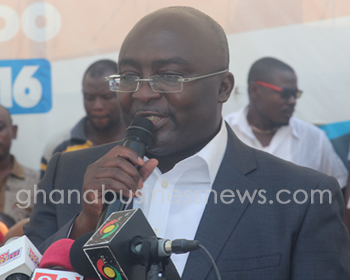We’ll take practical measures to improve port efficiency – Dr Bawumia
 Vice President Dr Mahamudu Bawumia says ports inefficiencies breed corruption and waste and gave the assurance that government would put in place appropriate policies to improve ports efficiency for accelerated national development.
Vice President Dr Mahamudu Bawumia says ports inefficiencies breed corruption and waste and gave the assurance that government would put in place appropriate policies to improve ports efficiency for accelerated national development.
He said these inefficiencies and man-made bottlenecks had direct bearing on the tax revenues collected at the ports that encouraged collusion among some importers, clearing agents and Customs officers to exploit the system.
He, therefore, charged various stakeholders rendering services at the country’s ports to adopt practical approaches towards removing those bottlenecks to improve the competitiveness of the ports and businesses as well as importers and exporters.
Vice President Bawumia said this when he delivered a keynote address at the Port Efficiency Conference in Accra on the theme: “Improving Port Efficiency and Trade Facilitation in Ghana” on Wednesday.
The conference brought together experts in marine operations worldwide including Dubia, Singapore and Antwerp as well as key stakeholders from the Ghana Ports and Harbours Authority (GPHA), Customs Division of the Ghana Revenue Authority, freight forwarders and importers and exporters.
The stakeholders would deliberate on bureaucratic bottlenecks hindering port operations and suggest measures to deal with the canker to improve efficiency at the ports and increase government revenues.
Vice President Bawumia, therefore, charged participants to delve deep into finding ways to improve access to berths, turnaround time for vessels calling at the port, dwelling time for containers, and processing and clearing times for import and exports to enhance ports efficiency.
He noted that an efficient port translated into competitiveness for importers and exporters and increased government’s revenues.
Vice President Bawumia said ports were the main gateway used by countries to access global trade and a critical component of a country’s ease of doing business and trade facilitation as well as key economic and trade drivers, therefore, there was the need to optimize their operations to increase revenue to the State.
He said the GPHA handled about 70 per cent of the national and neighbouring landlocked Burkina Faso, Mali and Niger’s trade and traffic, adding that the importance of the ports to the overall socio-economic development of the country and the sub-region could not be overemphasised.
He called for timely reporting and availability of accurate and consistent data in the ports operations in order to monitor and evaluate development process.
“Ghana’s ports have seen some improvements over the years. We have created new berths, built new terminals, upgraded equipment and implemented several reforms to raise the efficiency of the ports, facilitate trade, and improve revenue mobilisation.
“In spite of all these efforts, most users of our ports will agree that we are far from achieving the level of port efficiency that we all wish to see and to make Tema or Takoradi the ports of choice in the sub-region,” he said.
He gave the assurance that Government would work with the GPHA and other stakeholders towards the realisation of the objectives of the Tema and Takoradi port expansion to ensure rapid industrialisation.
Mr Kweku Ofori-Asiama, the Minister of Transport, said the conference aimed at making the country’s ports efficient to compete effectively with other ports in the Sub-region and generate adequate revenue to the Government to support national development.
Against this backdrop, he said the ports must have the required technology, infrastructure and human resource to provide efficient services in terms of handling of cargo and traffic.
He said over 80 per cent of the country’s trade volume was through sea transportation therefore the ports were very important assets for revenue mobilisation.
Mr Ofori-Asiama, therefore, urged the Customs Division of the Ghana Revenue Authority and GPHA, which collect duties and tariffs on behalf of the state, to address revenue leakages and adopt efficient ways of increasing revenues.
He called for infusion of information and communication technology and marketing of the ports worldwide to increase cargo volumes to generate more revenue to the Government.
In a 2013 study conducted by renowned researchers Brian Slack and Claude Comtois on “Ships Time in Port, an International Comparison,” the average time in port for vessels in Europe is about 25 hours, East and North Asia is about 17 hours, and South Africa is 64 hours while the Port of Tema did about 103 hours in 2016.
Source: GNA
